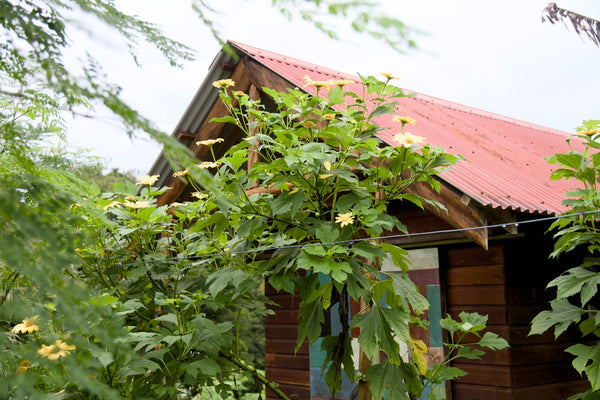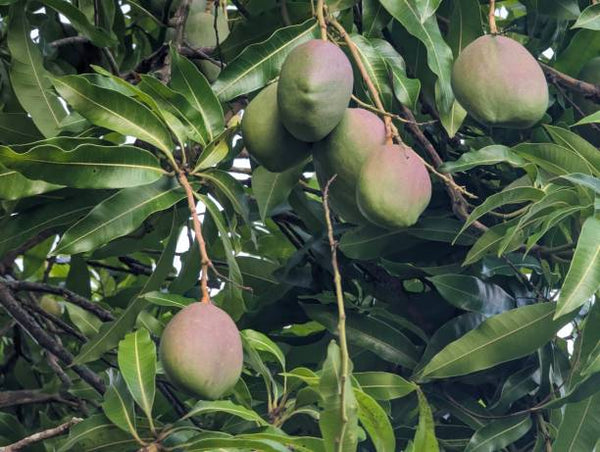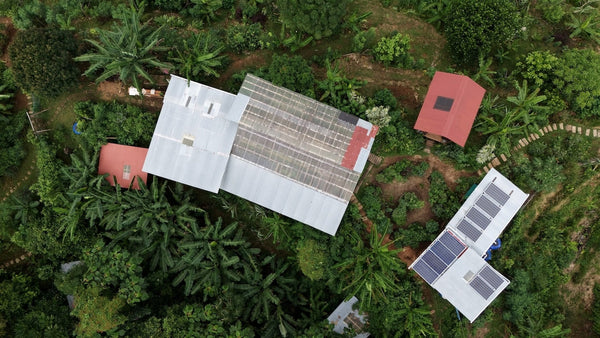At SoulFire Farm, we grow hundreds of plants, but there is one plant that stands out far above the rest - 🌻 Mexican Sunflower (Tithonia diversifolia) is by far the most useful plant we grow at our farm- a vibrant, resilient, and incredibly versatile plant that has become a cornerstone of our regenerative farming practices.
You might have seen its cheerful, bright yellow blossoms reaching for the sky, a beacon for pollinators. But beyond its undeniable beauty, Tithonia is a workhorse, a true ally to farmers and gardeners seeking sustainable and effective ways to build healthy, thriving agricultural ecosystems. If you're looking to boost your land's fertility, improve your soil, support your livestock, prevent erosion, and create a more resilient system, read on to discover why Mexican Sunflower deserves a place on your homestead.
What Makes Mexican Sunflower So Special?
Tithonia diversifolia, also known as Mexican Sunflower or Tree Marigold, is a fast-growing, shrubby perennial native to Mexico and Central America. It's incredibly adaptable, thriving in a wide range of conditions, including areas with poor soil and inconsistent rainfall – a testament to its hardy nature. Here on our farm, we’ve seen firsthand how readily it establishes and how quickly it gets to work.

Its key characteristics include:
Rapid Growth and Biomass Production: Tithonia grows vigorously, producing a large amount of leafy green biomass in a relatively short period. This makes it an abundant, renewable resource right on your homestead.
Exceptional Nutrient Accumulation: This is where Tithonia truly shines. It's a "dynamic accumulator", meaning it excels at drawing nutrients, particularly phosphorus and potassium, from deep within the soil and concentrating them in its leaves and stems. It also gathers significant amounts of nitrogen. Research consistently shows its green leaf biomass boasts impressive nutrient content:
Nitrogen (N): Typically around 3.0% to 3.8% (often averaging ~3.5%)
Phosphorus (P): Approximately 0.2% to 0.5% (often averaging ~0.37-0.38%)
Potassium (K): Around 3.5% to 4.5% (often averaging ~4.1%) These levels make its foliage a rich, natural fertilizer, often comparable to, and in some aspects exceeding, traditional amendments.
Resilience: It’s moderately drought-tolerant once established and can handle a variety of soil types. While it prefers full sun, it can tolerate some partial shade.
A Multitude of Uses: How Tithonia Can Revolutionize Your Homestead
The beauty of Tithonia diversifolia lies in its multifunctionality. It’s not just a one-trick pony; it’s a plant of many talents that can address various needs around the farm:
The "Chop and Drop" Champion – Green Gold for Your Soil:
This is perhaps Tithonia's most celebrated use. The leaves are exceptionally rich in nutrients, as the data shows. When cut and applied as a green manure or mulch ("chop and drop"), they decompose rapidly, releasing these vital elements back into the topsoil where your crops can readily access them.
Benefits: Improves soil structure and fertility, increases organic matter, enhances water retention, and can significantly boost crop yields. Studies have shown Tithonia-amended soil producing yields comparable to those using synthetic fertilizers, and its nutrient contribution often rivals traditional manures. For instance, Tithonia's nitrogen and potassium content frequently surpasses that of chicken manure.
How to: Simply cut the leafy branches (before they become too woody) and lay them around the base of your plants and trees. Avoid putting it too close to the trunk or stem of your plants and trees, always leave a few inches to avoid any possible fungal problems.

To put its fertilizing power into perspective, consider this comparison of Tithonia's typical nutrient range with other organic amendments:

Note: (% values based on dry matter) P and K values for Tithonia are converted to P₂O₅ and K₂O equivalents for easier comparison. Raw values: ~0.2–0.5% P, ~3.5–4.5% K. Manure values vary depending on source and management.
Furthermore, when compared to other green manure plants, Tithonia often stands out for its balanced nutrient profile, especially its high potassium content:

Note: (% values based on dry matter) - Source: Adapted from Gachengo et al.
Nutritious Fodder for Your Animals:
Tithonia leaves are a valuable source of protein and other nutrients for livestock. Goats, cattle and sheep relish the leaves, soft branches, and even the flowers. We no longer have sheep, but when we did, Tithonia was an important part of their diet, along with moringa, katuk, banana leaves, and some of our very valuable fruit trees 😲 —the last one being the reason we no longer have sheep.
Benefits: Provides a readily available, protein-rich supplement, especially valuable during dry seasons when other forage may be scarce. It can contribute to improved animal health and productivity.
Building Soil Health and Preventing Erosion:
With its dense growth habit and strong root system, Tithonia is an excellent plant for stabilizing soil and preventing erosion, especially on slopes or in areas prone to runoff.
Benefits: Helps hold topsoil in place, reduces water loss, and contributes to the overall health and structure of the soil. Planting Tithonia as hedgerows along contours is a highly effective erosion control strategy.
We use Tithonia for erosion control across our farm with great success, vetiver grass is a great option as well, but vetiver takes a long time to establish and it's not effective if you need a solution right away; we often use both plants together, planting a row of Tithonia followed by a row of vetiver. This allows the vetiver to grow while the Tithonia begins to hold the soil quickly. We eventually cut down the Tithonia.

We also use Tithonia to passively terrace steep hills by planting rows on contour, as the rows establish they create a barrier for organic matter to accumulate, this creates terraces over time, we also chop and drop the Tithonia to speed up the process.
Attracting Beneficial Insects and Pest Management:
Those vibrant flowers aren't just for show! Tithonia is a magnet for pollinators like bees and butterflies, which are crucial for fruit and vegetable production. Furthermore, some research suggests Tithonia can play a role in integrated pest management.
Benefits: Enhances pollination on your homestead. It can act as a "reservoir" or "banker plant," attracting and hosting beneficial insects (natural enemies of pests) that can then help protect your crops. Extracts from Tithonia have also been explored for their potential biopesticidal properties against pests like termites.
Living Fences and Boundary Markers:
Its fast, bushy growth makes Tithonia an excellent choice for creating living fences, windbreaks, or marking boundaries on your property.
Benefits: Provides a natural, living barrier that can offer shelter, privacy, and contribute to the farm's ecosystem, all while being a productive part of it.
Quick shade:
If you need to shade an area of your garden, Tithonia is a great choice for quick shade, they can grow quickly, easily reaching over 10 feet tall in just a few months! We often use it to provide temporary shade to young fruit trees as they establish, we trim as needed to let more sun in and use the trimmings to feed to the fruit trees as they grow, truly a Win-Win.

Growing Tithonia on Your Homestead: It's Easier Than You Think!
One of the best things about Mexican Sunflower is how easy it is to grow and propagate.
Propagation: It can be readily propagated from stem cuttings. Cuttings, about 20-40 cm long from mature (but not overly woody) stems, root easily when planted directly into the ground.
Planting: Choose a sunny spot. While it's adaptable, well-drained soil will give it the best start.
Maintenance: Tithonia is relatively low-maintenance. Once established, it’s quite hardy. You can prune it regularly to encourage bushier growth and to harvest its valuable biomass. Cutting it back a few times a year will provide you with a continuous supply of green manure.
The Invasiveness Controversy:
If you research the Tithonia plant online you will find both lovers and haters of this plant, amongst the haters the most common complaint is that this plant can become invasive and take over your yard, while this may be the case if you let it grow totally unmanaged, we haven't had any issues at our farm by providing regular pruning.
There are a few ways this plant can become invasive; one way is if you grow the Tithonia varieties that produce viable seeds, the one we grow and sell in our nursery does not produce viable seeds and can only be propagated by cuttings.
Another way they can take over your yard is If you let them grow unmanaged, they will grow very tall and eventually bend down towards the ground, once the branches reach the ground they will send new roots and continue spreading, this is totally avoidable by occasionally chopping the tops down. You can cut them as low as you wish and they will re-sprout new shoots quickly. Even if they spread, they are very easy to eliminate with a machete or pruning saw.

Bring the Power of Mexican Sunflower to Your Homestead!
At Soul Fire Farm, Tithonia diversifolia is more than just a plant; it’s a partner in our efforts to farm regeneratively and grow thriving homestead. Its ability to enrich the soil with significant amounts of nitrogen, phosphorus, and especially potassium, support biodiversity, and help with erosion control is truly priceless. The data speaks for itself – this plant it's a must have for every homestead.
We believe so strongly in the power of this plant that we want to share it with you. Tithonia can:
- Boost your soil's natural fertility with a potent, farm-grown resource and reduce reliance on external inputs
- Provide nutritious, homegrown fodder for your livestock
- Enhance pollination and biodiversity on your land
- Control erosion and build healthier soil structure
- Embrace a truly multifunctional plant that works as hard as you do
Ready to get started? We have fresh Tithonia diversifolia cuttings available at our nursery. Let us help you integrate this ecological superstar into your own growing spaces.
Join us in cultivating abundance and resilience from the ground up with the incredible Mexican Sunflower!






0 comments